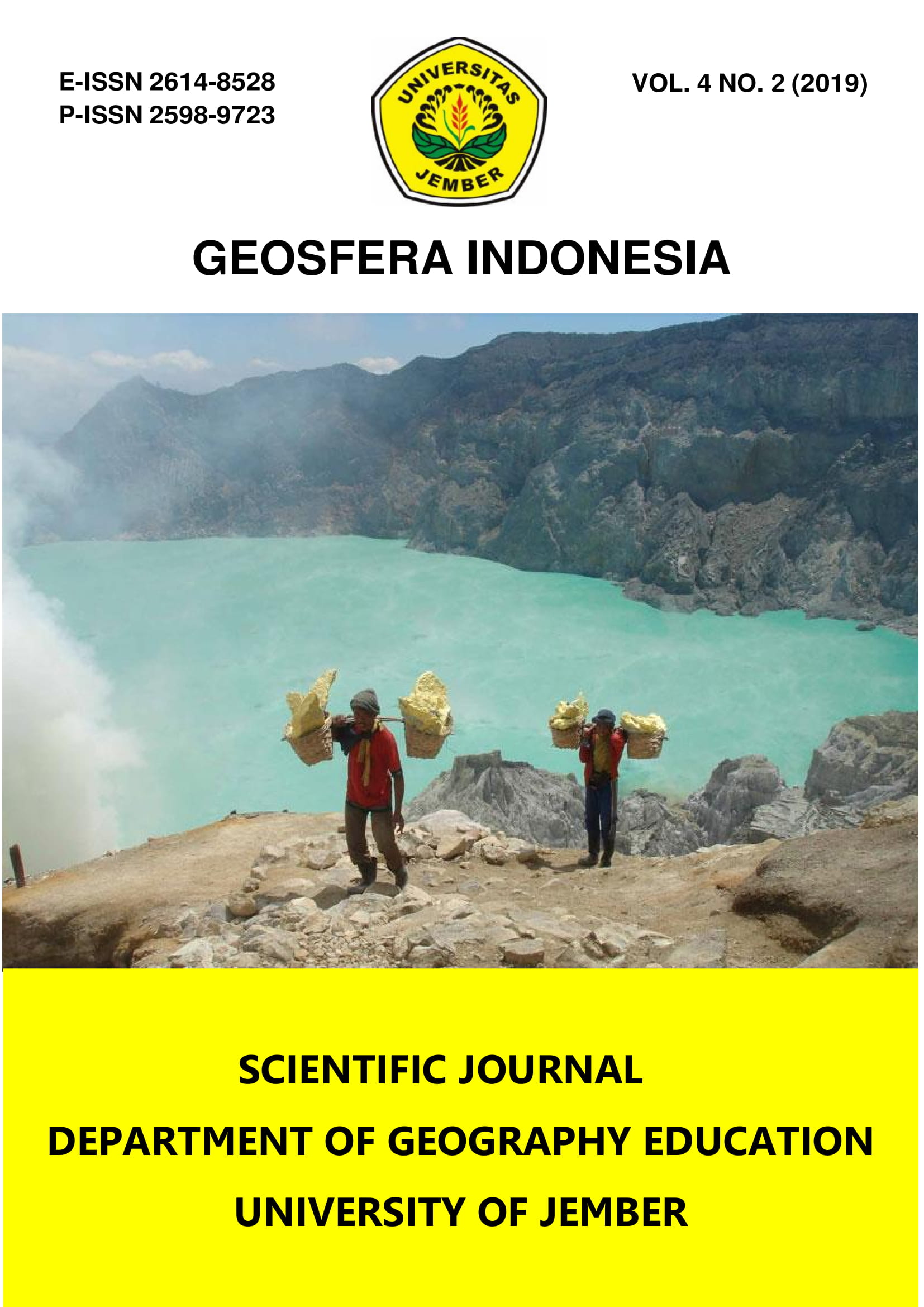THE SPATIO-TEMPORAL VARIATIONS OF WIND SPEED DURING HARMATTAN SEASON IN NORTHEASTERN NIGERIA
DOI:
https://doi.org/10.19184/geosi.v4i2.11474Abstract
Wind speed is the principal climatic element that drives the Marmaton season in West African sub region. It drives the season by conveying huge amount of dust across the Northeastern Nigeria. The presence of dust in the atmosphere brought by the Northeast trade winds during the Harmattan season plays a vital role in absorbing and scattering solar radiation. The study examines the spatial and temporal variations of wind speed in Northeastern Nigeria during the Harmattan season with the sole aim of ascertaining its variability, patterns and trends from1984 to 2014. Descriptive and statistics such as mean, standard deviation, coefficient of variation, and time series analysis with ArcGIS 10.3 was used in examine the temporal and spatial variations of wind speed from 1984–2014 in six synoptic stations of Northeastern Nigeria. The findings show that wind speed varied both temporally and spatially in the last three decades. The pattern of variations in the six synoptic stations shows rising trends within the study years. It was also found that latitude playing a crucial role in determining the speed of the wind in the study area and as the speed of the wind increases with increasing latitude.
Keywords: Wind speed, Harmattan, Season, Northeast, Variation and ITD.
References
Adaramola,M.S.andOyewola,O. M. (2011). Wind Speed Distribution and Characteristics in Nigeria. Asian Research Publishing Network (ARPN). Journal of Engineering and Applied Sciences.ISSN 1819-6608.www.arpnjournals.com
Amadi, S. O., Udo, S. O. and Ewona, I. O. (2014). Trends in Monthly Mean Minimum and Maximum Temperature Data over Nigeria for the Period 1950-2012. International Research Journal of Pure and Applied Physics, 2(4), 1-27.
Ayoade, J.O. (2004). Introduction to Climatology for the Tropics.2nd ed. Spectrum Books Limitted, Spectrum House Ring Road Ibadan, Nigeria.
Balarabe, M., Abdallah, K., and Nawawi, M. (2015). Long- Term Trend and Seasonal Variability of Horizontal Visibility in Nigerian Troposphere.Journal of Atmosphere 6:1462-1486; doi:10.3390/atmos6101462.
Dahuwa, D., Promise, K. U., Umar, W., Bello, I. and Mohammed, R. (2018). Analysis of Wind Speed And Frequency InAzare North eastern Part of Nigeria. IOSR Journal of Applied Physics (IOSR-JAP) e-ISSN: 2278-4861.Volume 10, Issue 1 Ver. I. PP 09-17 www.iosrjournals.org DOI: 10.9790/4861-1001010917 www.iosrjournals.org
Danlami, D., Gwari, M., Suleiman, S., and Bara, A. (2018). Temporal and Spatial variations of Groung Surface visibility during Harmattan Season in North-Eastern Nigeria.Ceylon Journal Science, 47(4), 337 – 346. DOI: http://doi.org/10.4038/cjs.v47i4.7551.
Danlami, D. (2017). Spatio-Temporal Variations of Harmattan Season in Northeastern Nigeria.M.Sc. Dissertation (Not published) Submitted to the Department of Geography, Bayero University, Kano, Nigeria.
De Longueville, F., Hountondji, Y. C., Henry, S. and Ozer, P. (2010). What do we Know about the Effects of Desert Dust on Air Quality and Human Health in West Africa compared to other regions? Journal: Science of Total Environment
Fagbenle, R.L., Fasade, A.O., Amuludun A.K. andLala,P.O.( 1980). Wind power potentials of Nigeria. 12th Biennial conference of the West African Science Association, University of Ife, Nigeria.
Getis, A., Getis, J., Bjelland, M. and Fellmann, J.D. (2011).Introduction to Geography. 13thed. The McGraw-Hill Companies, Inc., 1221 Avenue of the Americas, NY10020.
Karabulut, M., Demirci, A. and Kora, F. (2012). Analysis of spatially distributed annual, seasonal and monthly temperatures in Istanbul from 1975 to 2006.World Applied Sciences Journal, 12(10), 1662-1675
Ojosu, J.O. and Salawu, R.I. (1990).An evaluation of wind energy potential as a power generation source in Nigeria.Solar & Wind Technology.ELSEVIER.Volume 7, Issue 6, 1990, Pages 663-673
Schwanghart, W. and Schutt, B. (2007). Meteorological causes of Harmattan dust in West Africa. Journal of Science Direct Geomorphology.
Shuman, M. (2007) Evaluation of five GIS basedInterpolation techniques for estimating the Radonconcentration for unmeasured zip codes in thestate of Ohio, Master of Science Degree in Civil Engineering, University of Toledo, 28-29 Pp.
Waewsak, J., Chancham, C., Landry, M. and Gagnon, Y (2011).An Analysis of Wind Speed Distribution at Thasala, Nakhon Si Thammarat, Thailand.Journal of Sustainable Energy & Environment 2 pp 51-55
Willmott, C., Robeson, S. and Philpot, W. (1985). Small- scale climate maps: A sensitivity analysisof some common assumptions associated withgrid-point interpolation and contouring. American Cartographer 12(1):5-16.
Copyright (c) 2019 Geosfera Indonesia Journal and Department of Geography Education, University of Jember

This work is licensed under a Creative Commons Attribution-Share A like 4.0 International License



